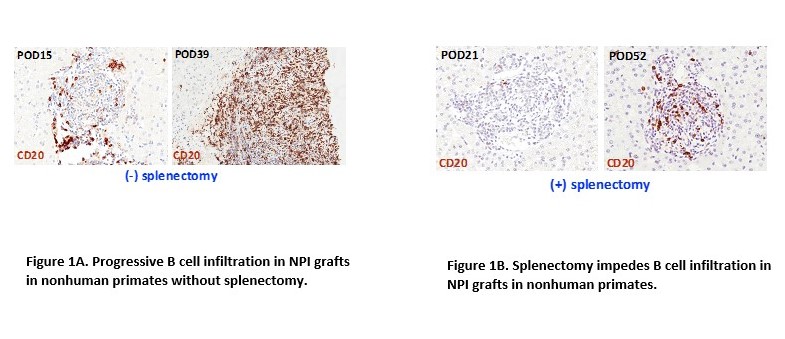Splenectomy Impedes B Cell Infiltration Associated with Rejection of Neonatal Porcine Islet Xenografts
Duke University, Durham, NC
Meeting: 2020 American Transplant Congress
Abstract number: A-277
Keywords: B cells, Co-stimulation, Islets, Primates
Session Information
Session Name: Poster Session A: Xenotransplantation
Session Type: Poster Session
Date: Saturday, May 30, 2020
Session Time: 3:15pm-4:00pm
 Presentation Time: 3:30pm-4:00pm
Presentation Time: 3:30pm-4:00pm
Location: Virtual
*Purpose: Xenotransplantation has historically been frustrated by antibody-mediated rejection. Splenectomy has shown efficacy in mediating humoral immunity. We hypothesized that adding splenectomy to a clinically available immunosuppressive regimen would improve porcine islet xenograft survival.
*Methods: After induction of diabetes with streptozotocin, rhesus macaques served as xenograft recipients. Neonatal porcine islets (NPI) were isolated from GKO or GKO/hCD46 transgenic piglets (Revivicor, Inc.) by a modified Korbutt technique and infused into the portal vein of recipients. One group of recipients (n=3) received induction with rhesus anti-thymocyte globulin and maintenance with belatacept, tacrolimus from days -2 to 21, sirolimus from day 22 onward, and mycophenolate mofetil. A second group of recipients (n=3) underwent splenectomy on day 0 but otherwise received the identical regimen. Graft survival was defined as a detectable serum porcine c-peptide level. At sacrifice, liver specimens were fixed for immunohistochemistry (IHC) and quantitative analysis was performed using the Aperio Imagescope.
*Results: Median graft survival was 44 days in the group without splenectomy and 63.5 days in the splenectomy group (p=0.56). All recipients without splenectomy showed a significant B cell infiltrate (positive CD20 staining by IHC) at the time of rejection that was more prominent over time (Figure 1A). In the splenectomy group, one animal died without rejection (anesthesia complication) on postoperative day (POD) 21 and demonstrated significantly less B cell infiltration compared to rejecting splenectomized recipients at later timepoints (Figure 1B, p<0.05) and compared to a rejecting non-splenectomized recipient at a similar early timepoint (POD15, Figure 1A, p<0.05).
*Conclusions: Under a clinically available immunosuppressive regimen, rejecting NPI xenografts demonstrated B cell infiltration that became more prominent over time. Splenectomy impeded B cell infiltration, suggesting that more complete control of the B cell response may be salutary.
To cite this abstract in AMA style:
Fitch ZW, Song M, Schmitz R, Leopardi F, Ribeiro M, Miller A, Devi G, Collins B, Luo X, Kirk AD. Splenectomy Impedes B Cell Infiltration Associated with Rejection of Neonatal Porcine Islet Xenografts [abstract]. Am J Transplant. 2020; 20 (suppl 3). https://atcmeetingabstracts.com/abstract/splenectomy-impedes-b-cell-infiltration-associated-with-rejection-of-neonatal-porcine-islet-xenografts/. Accessed February 25, 2026.« Back to 2020 American Transplant Congress

